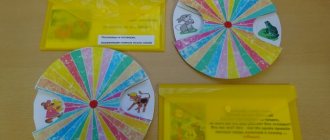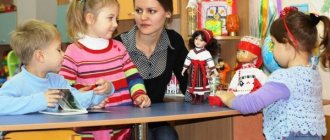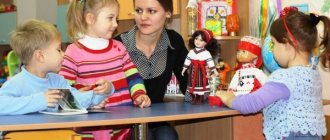Features of social and moral education of preschool children
The social and moral education of children begins from the first years of life and is based on the formation of positive human qualities.
A child in preschool age should be instilled with moral qualities through work activity, creativity and playful forms of education. In the process of communication in preschool institutions, the child shows his character, develops social and moral qualities, positions himself as a citizen and determines his position in society.
In order for the social and moral education of preschool children to be effective, it is necessary to carry out systematic educational work with children. Labor activity plays an important role in the education process, during which the child develops, achieves his goals and improves his skills.
The social and moral education of children should be implemented in close interaction between parents and teachers of preschool educational institutions. The formation of a child’s social and moral qualities should be carried out within the framework of his social life and interaction in the children’s team.
“Education of a socially responsible personality based on spiritual and moral values”
“Education of a socially responsible personality based on spiritual and moral values”
Issues of moral development, education, and human improvement have always worried society at all times. Especially now, when cruelty and violence can be encountered more and more often, the problem of moral education is becoming increasingly relevant. Who else but a curator who has the opportunity to influence the upbringing of a child should give this problem a major role in his activities. And that is why the goal of the teacher is to protect the child from the world of cruelty and rudeness, to introduce the pupil to the principles of morality and ethics, and to form moral ideas and concepts.
The main core in the overall system of comprehensive personal development is moral education.
Moral education is the basis of all foundations; depending on what the teacher puts into the child’s soul, it will depend on what he himself will build in the future, how he will build his relationships with others.
In moral education, it is important not only to formulate moral consciousness and moral feelings, but most importantly, to include the student in various activities where their moral relations are revealed.
The effectiveness of moral education is possible by creating pedagogical conditions: motivational, content, operational. It is necessary to teach constantly, demandingly, persistently, in various forms, taking into account the individual and age characteristics of children.
Provided that educational work is properly organized, the likelihood of acquiring the traits of a morally stable and mature personality, capable of further adaptation in society, increases.
Today it is no longer enough to simply cultivate traditional value attitudes. We are talking about an individual capable of managing his behavior based on existing standards, norms and laws of society.
The formation of such a personality must begin with moral education. It is necessary to form the nature of moral experiences associated with norms or deviations from norms and ideals: pity, sympathy, trust, gratitude.
Currently, Russia is going through one of the difficult historical periods. And the greatest danger facing our society today is the destruction of the individual. Today, material values dominate over spiritual, moral, aesthetic values, so children have distorted ideas about kindness, mercy, generosity, justice, citizenship and patriotism. The high level of child crime is caused by a general increase in aggressiveness and cruelty in society. Against the backdrop of media propaganda of cruelty and violence, advertising of alcoholic beverages and tobacco products, the situation becomes even more complicated; children’s ideas about the main human spiritual values are displaced.
Moral education has a beneficial effect on all aspects and forms of a teenager’s relationship with the world: his ethical and aesthetic development, worldview and the formation of a civic position, patriotic and family orientation, intellectual potential, emotional state and general physical and mental development. Education of the moral principles of the individual is the most important task. The faster a child masters and understands the norms of correct behavior in society, the faster he adapts to our diverse world and the faster the process of becoming a mature personality will be noticeable.
The purpose of moral education
: education of moral values; formation of the necessary knowledge and skills that contribute to the development of a mature personality; using the acquired knowledge for practical purposes to correct interpersonal relationships; developing skills of self-analysis of actions from the point of view of norms of social behavior; increasing the level of culture of schoolchildren.
Tasks:
— formation of stable moral and moral properties of the pupil’s mature personality;
— development of cultural communication skills and behavior related to the implementation of generally accepted norms of public order;
- fostering a respectful attitude towards the work of adults, a sensitive, caring attitude towards friends, comrades, relatives and friends;
— increasing the level of general development;
— help the child master basic social roles, moral and ethical standards.
Main blocks of work:
1. I and I (formation of the need for self-education of one’s moral qualities, cultivation of a culture of communication and behavior).
2. I and society (cultivating an understanding of belonging to a team, the desire to combine personal and public interests, creating an atmosphere of friendship and camaraderie, mutual assistance).
3. I and the Fatherland (cultivating a sense of patriotism, courage, honor, loyalty to the Motherland, consolidating spiritual traditions).
4.Me and family (formation of ideas about family values, raising a family man).
The priority direction of education should be the formation of the moral qualities of the child, which are the foundation of education. To do this, it is necessary to develop in him kindness, friendliness, endurance, determination, courage, an optimistic attitude towards life, a sense of the joy of existence, the ability to feel happy, believe in one’s own strengths and trust in the world.
To motivate children to moral actions, it is necessary to interest them, create positive emotions when mastering knowledge, use positive examples from life, personal example. High healing power, a life-affirming mood, and a good mood in children are caused by mass events and holidays, the organization of exhibitions of children's creativity, drawings, crafts, as well as playing out various situations and finding ways out of them.
Examples of exercises.
ROLE PLAYING THE SITUATION
The exercise is performed in pairs; it is aimed at specific elaboration, the use of “magic” means of communication, the development of empathy, and the use of already familiar means of understanding. Children are given game situations that they stage.
You took part in a competition, took first place, and your friend was almost last. Your actions, words.
Your friend asked you for your favorite player and returned it broken. Your actions, words.
Mom brought three oranges: for you and your friend. How will you divide them? Why?
The guys are playing an interesting game, and you are late for the start. Ask to be accepted into the game. What will you do if they refuse you and don’t let you play?
You really offended your friend. Apologize and try to make peace.
COLLECTIVE WRITING OF A FAIRY TALE
Goal: Development of creative imagination, group work skills: the ability to take into account the course of the plot, understanding the norms of cultural communication and behavior.
Children are given several consecutive pictures (according to the number of participants) with a general plot, which constitute the basis for a coherent story. Everyone chooses one picture and prepares a story based on it (but everyone puts the pictures in order together to have an idea of the general plot).
To better assimilate the material, you can use ethical games.
(Krivchinkova E.N. Ethical play as a means of developing the moral and social aspirations of a child // Ethical education, 2005, No. 1)
Task No. 1: “Honesty cabinet”
. Before completing the task, ask the children what honesty is. You can warn them that if they do not want to answer the truth to a question asked, then it is better to remain silent than to tell a lie. Choose one of the proposed questions, stand on the “Honesty Stand” and answer it.
Task No. 2: “Magic chair”
Before completing the task, remind the children that telling the truth about themselves is easier than listening to it from others. It is important to set children up for positive statements and not force the child to sit on the “Magic Chair” if he does not want to. Sit on a chair and listen to the team’s opinion about you.
Task No. 3: “Panorama of actions”
Choose 10 bad and 10 good deeds. Ask children to comment on their answers, focusing on actions that pose a threat to life.
Task No. 4: “Assess the situation”
Listen to the situation and say what character qualities the hero has. Ask children to put themselves in the shoes of the offended person and express their feelings.
Task No. 5: “Laws of the collective
“Think together and decide which laws are important to observe every day so that no one’s mood is spoiled? Make the children promise to follow the laws they have chosen and every month reward those who have never violated them.
The relationships between students in the team play an important role, so I very often spend these short five-minute sessions with teenagers:
• "Ethical Five Minutes"
: collective search for a way out of already existing conflict situations and determining ways to overcome them.
• "Ethical exercise":
daily attitude toward kindness and respect in relationships with others.
When working with teenagers, much attention should be paid to developing a sense of patriotism and involvement in the heroic history of the Russian state.
1. Educational hour-presentation “Facts about the Second World War.”
2.Preparation for the parade of formations and songs.
3. Arts and crafts (postcards for veterans and production of wall newspapers).
4. Conversation “Russia is my Motherland”, “Bashkortostan is my native land.”
All this helps to consolidate basic ideas about national heroes and the most important events in the history of Russia and the Republic of Bashkortostan.
Much work needs to be done to instill family values so that students develop a correct idea of the family, respect for the older generation, and protection and assistance for the younger generation.
1. Conversation - game “Family - what is it?”
2.Discussion “Family Traditions”.
3. Educational hour “Family budget”.
4. Round table “What does it mean to be a good son.”
A lot of work is carried out during everyday and work activities, because cleaning the office, one’s room, clean-up days, being on duty in the dining room and around the college also play an important role in the education of moral values. These events contribute to the development of such important qualities as: hard work; helping others; compliance with certain norms and rules in society; responsibility not only for oneself, but also for others; creating an atmosphere of camaraderie in the group.
We need to teach students to do more positive, thoughtful actions, and if they stumble, try to figure it out with them and analyze the situation. All this is facilitated by the following conversations:
1. “How to learn to live without conflicts.”
2. “What rules do we live by?”
3. Educational hour “I am a cultured person.”
4. Conversation - reasoning “My place in life.”
Thus, the following conclusions can be drawn. Spiritual and moral education is defined as the purposeful formation of moral consciousness, the development of moral feelings and the development of skills and habits of moral behavior.
Adolescents have the opportunity to consciously manage their behavior and strive to develop qualities that correspond to their moral views and beliefs. Adolescents’ desire for moral knowledge is driven by an interest in their own personality.
To instill moral values in adolescents in the future, it is necessary to organize work in accordance with the program I have developed, the key system-forming means of which is an individually differentiated approach. Therefore, it is necessary to form a conscious attitude towards developing moral qualities in oneself in order to become a mature person and exist in society.
The concept of moral education
Modern Russian society finds itself at the epicenter of moral and ethical problems.
The processes of globalization and universalization affect the culture of the country, the destruction of traditional national spiritual values occurs, as a result of this, social evil increases, as well as moral mistrust of each other intensifies, interpersonal and interethnic conflicts are perceived as a common occurrence, empathy disappears, a tendency is established to destroy national cultural traditions, the ideals of young people are reoriented from spiritual to material. The question of the ethical dimension of the negative consequences of imposing elements of Western living standards on our society remains relevant, which further aggravates the crisis of spirituality in Russian society. This can be seen in the devaluation of morality and moral imperatives, as well as in the absence of humane attitudes at the level of interpersonal relationships, thanks to which the full development of personality occurs.
Are you an expert in this subject area? We invite you to become the author of the Directory Working Conditions
Russian society, more than ever, requires the presence of a socially valuable and spiritually stable personality, a “moral person” with a high level of culture, capable of becoming a responsible, active, active subject of social development.
Among researchers there is no definition of the concept of “moral education”; they characterize it as:
- complex integrated process;
- the process of formation of moral qualities, character traits, skills and habits of behavior;
- a social phenomenon that obeys the laws of social development;
- purposeful influence of the older generation on the younger generation in order to develop stable moral qualities in them;
- a purposeful process of organizing and stimulating diverse activities and communication, aimed at mastering a moral culture of behavior and attitude towards the surrounding world;
- a process whose specific functions are carried out according to its own rules and patterns;
- the core of harmonious personality development;
- the form of transformation of experience and the sphere of implementation of human moral culture;
- development of skills and abilities of moral behavior, formation of humane relationships.
Finished works on a similar topic
Course work Moral education - goals, features, methods 480 ₽ Abstract Moral education - goals, features, methods 220 ₽ Test work Moral education - goals, features, methods 200 ₽
Receive completed work or specialist advice on your educational project Find out the cost









